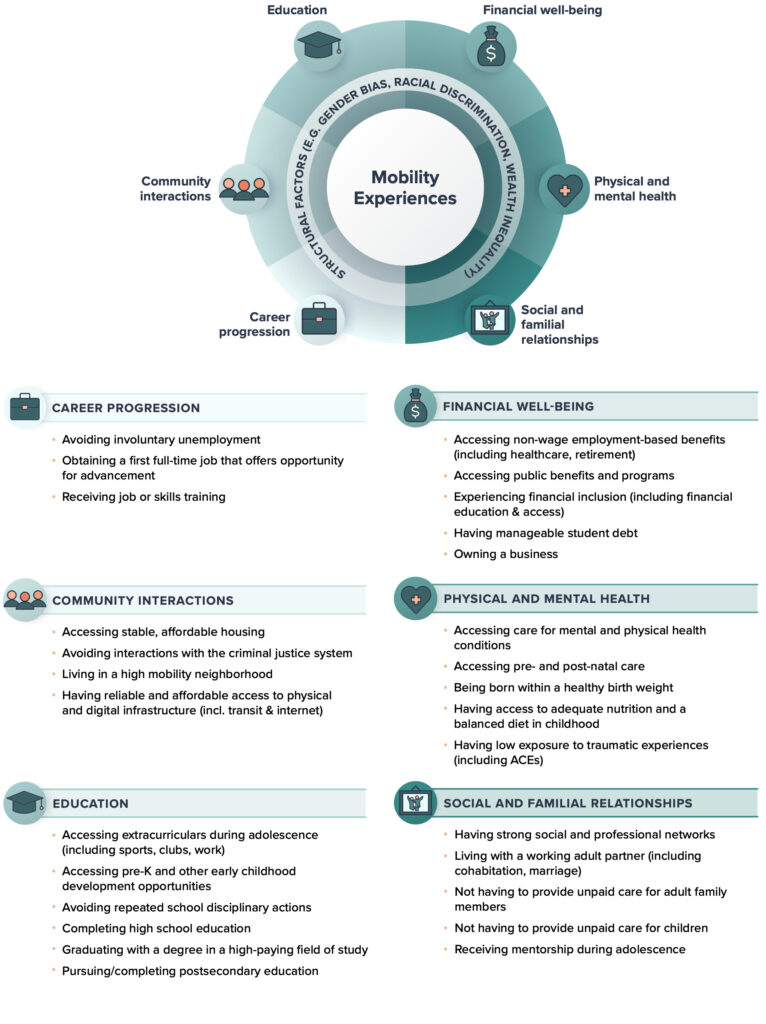
In our new research series Mobility Experiences, published in partnership with the Bill and Melinda Gates Foundation, we tackle some of the most foundational questions pertaining to economic mobility in the United States, including:
- What drives upward, downward or no mobility for most Americans?
- What narratives or perceptions of economic mobility do Americans hold?
- How can resources be better deployed to address structural barriers to economic mobility for all Americans?
- What is the impact on income of interventions that promote certain life experiences?
Foundational to economic mobility is the prospect of experiencing economic success, being valued in one’s community, and having the power and autonomy over one’s life path. For many Americans, economic mobility has been replaced by perpetual economic precarity. Many are often just one unforeseen expense away from falling into poverty, whether that be getting evicted, experiencing a major health crisis, or incurring a car repair cost, a majority of Americans will experience poverty at some point in their lives.[1] Poverty rates remain stubbornly high in the United States compared to other OECD countries. For the vast majority of Americans, the United States is not by most indicators a “land of opportunity” where one can assuredly expect upwards mobility in their lifetimes.
In the first report of our Mobility Experiences research series, we summarize a meta-analysis of more than 230 academic studies, along with a survey of 4,000+ Americans, to provide a holistic understanding of what drives economic mobility. Key findings reveal the relative impact that 28 important life experiences have on lifetime income. These “mobility experiences” span across nearly every aspect of a person’s life, from education, career, and finances to health, community, and relationships. Economic mobility is partially shaped before a person is ever born and influenced by systemic and structural factors which often outweigh the impact of personal actions and endeavors.

Through this research, we have found evidence of value across these 28 experiences, with Americans experiencing them in unique ways across their lifetimes, leading to varying economic trajectories. Though each of these experiences has important impacts on economic mobility, four experiences in particular were found to have significant evidence of average impact on lifetime earnings greater than 20%. These experiences include:
- Pursuing/completing postsecondary education
- Graduating with a degree in a high-paying field of study
- Receiving mentorship during adolescence
- Obtaining a first full-time job that offers opportunity for advancement

For the first time, we have been able to quantify the relative impacts of certain life experiences on economic mobility. We hope these findings are affirming for practitioners in the field, while also adding to our collective evidence base. This knowledge is not only critical to aligning stakeholders around a fact-base, but also to supporting calls for funding, policymaking, and scaling interventions that will have the greatest impact on advancing mobility and opportunity across the country. When we build systems that allow people to access critical supports—and basic human rights—like healthcare, education, high quality jobs, and thriving communities, people have the power to live the lives to which they aspire.
We anticipate that stakeholders across the economic mobility field will benefit from Mobility Experiences research in four primary ways:
- Frontline service organizations can utilize the findings to demonstrate the potential impact of their interventions when seeking funding support
- Funders can utilize the findings to prioritize investments in economic mobility
- Local decision makers can utilize the findings to prioritize policymaking and identify high potential interventions
- Communication organizations can utilize the findings to shift widely held narratives about the drivers of economic mobility in the United States
Throughout 2024, Camber Collective and the Bill and Melinda Gates Foundation will be releasing three reports as part of the Mobility Experiences research series. The reports will explore both the quantified impact of life experiences on lifetime income as well as the perspectives of thousands of Americans on what matters to advance individual and collective economic mobility in the United States. We will also dive into the current state of funding for economic mobility and common features of successful interventions.
The research can be found on the Mobility Experiences website. We encourage you to sign up for updates to stay up to date with upcoming releases. Read the Report
[1] Mark Robert Rank, Lawrence M. Eppard, and Heather E. Bullock, Poorly Understood: What America Gets Wrong About Poverty, Oxford Academic, 20 May 2021. https://doi.org/10.1093/oso/9780190881382.003.0001
